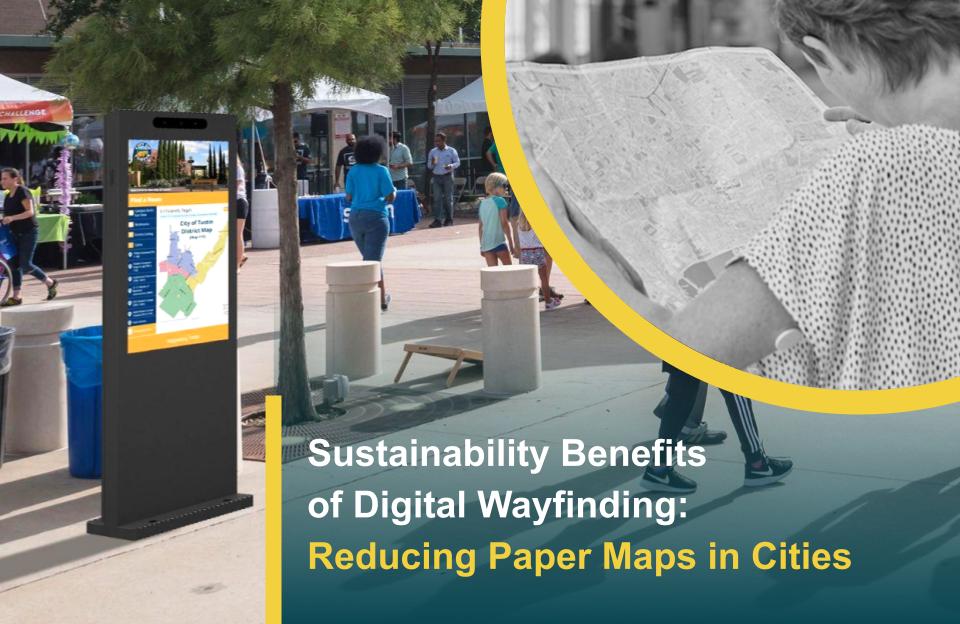Published: Jan 14th, 2025
Sustainability Benefits of Digital Wayfinding: Reducing Paper Maps in Cities

As cities strive to become smarter and more environmentally conscious, the transition from traditional paper maps to digital wayfinding solutions is gaining momentum. These interactive kiosks not only provide precise navigation and real-time information but also significantly reduce the environmental footprint associated with paper production and waste. This blog explores how digital wayfinding solutions contribute to sustainability, supporting global efforts to combat environmental challenges.
The Environmental Cost of Paper Maps
While paper maps have long been a staple for city navigation, their production, distribution, and disposal carry significant environmental costs:
- Deforestation: The production of paper consumes millions of trees annually, contributing to habitat loss and decreased air quality.
- Energy and Water Usage: Manufacturing paper involves high energy and water consumption, increasing the carbon footprint.
- Waste Generation: Discarded maps often end up in landfills, where they decompose and release greenhouse gases.
By replacing paper maps with digital wayfinding kiosks, cities can reduce their reliance on paper, mitigating these environmental impacts.
Digital Wayfinding as a Sustainable Alternative
Digital wayfinding kiosks offer an eco-friendly solution for modern cities. These systems provide:
- Real-Time Navigation Updates
Unlike static paper maps, digital wayfinding kiosks display dynamic, real-time information, ensuring accuracy in navigation. Visitors can easily locate businesses, attractions, or public transit routes without relying on disposable maps.
- Reduced Resource Consumption
By eliminating the need for paper maps, cities can conserve trees, energy, and water while reducing transportation emissions from distributing printed materials.
- Longevity and Versatility
Digital kiosks are designed for long-term use, with the ability to update content instantly. This longevity prevents the repeated printing of updated maps, saving resources over time.
Improving Urban Sustainability
Adopting digital wayfinding kiosks aligns with broader sustainability initiatives, including:
- Encouraging Public Transit Usage: By displaying real-time transit schedules and routes, kiosks encourage the use of eco-friendly transportation.
- Promoting Walkability: Digital maps guide pedestrians through urban spaces, reducing dependency on vehicles and lowering carbon emissions.
- Supporting Local Businesses: Interactive features highlight local shops and attractions, boosting the local economy while promoting sustainable consumer behavior.
Case Study: Digital Wayfinding in Action
Cities like Amsterdam, Singapore, and Vancouver have embraced digital wayfinding solutions to enhance navigation and sustainability. For instance:
- Amsterdam: Digital kiosks provide cycling maps and public transport information, reducing the need for printed materials.
- Singapore: Eco-friendly digital screens in public spaces display real-time updates on events and attractions.
- Vancouver: Digital wayfinding systems promote green spaces and walking paths, encouraging eco-conscious exploration.
Eflyn’s Contribution to Sustainable Wayfinding
Eflyn’s digital wayfinding solutions are designed with sustainability in mind, offering:
- Energy-Efficient Displays: High-performance, low-energy screens that minimize power consumption.
- Durable Materials: Long-lasting designs reduce waste from frequent replacements.
- Cloud-Based Management: Centralized control eliminates the need for printed updates or additional physical resources.
Challenges and Opportunities
While digital wayfinding offers numerous sustainability benefits, its implementation requires careful planning and investment. Key considerations include:
- Initial Costs: The upfront investment in kiosks may be significant, but the long-term savings in reduced paper usage and waste make it worthwhile.
- Public Awareness: Educating residents and visitors on the benefits of digital systems ensures widespread adoption.
The growing demand for sustainable urban solutions presents an opportunity for cities to embrace digital wayfinding as a core component of their green initiatives.
Key Insights
Digital wayfinding is more than a tool for navigation; it’s a sustainable solution that addresses the environmental challenges posed by paper maps. By reducing resource consumption and waste, these systems help cities meet sustainability goals while improving the user experience.
Eflyn’s state-of-the-art digital wayfinding kiosks are at the forefront of this eco-friendly revolution, offering smart, sustainable solutions for modern cities. Contact us today to learn how Eflyn can transform your city into a greener, smarter place.
